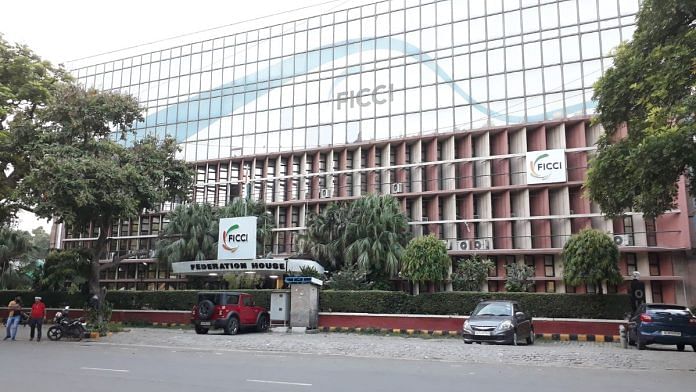New Delhi: Increase of illicit markets in India and emergence of non-market actors involved in such activities run by players associated with terrorism and crime are creating a major threat to global and national security — the FICCI 2023 report has noted.
Establishing links between terrorism and illicit financial flows — noting how money laundering is a significant contributor, including several others such as tax evasion, mis-invoicing, mis-declaration — the FICCI report stated that India suffered an approximate revenue loss of US $13 billion, encompassing both mis-invoiced imports and exports in 2016.
India saw a massive aggregate value gap of mis-invoicing amounting to over $674.9 billion between 2009 and 2018.
Value gaps are the difference between the actual price of a financial asset to its perceived value. The report noted that in 2018, India, one of the five largest economies, had a value gap of US $84.9 billion, which is not just indicative of India’s impending growth but also how these funds could be used for terror financing.
The report has been prepared by the Thought Arbitrage Research Institute (TARI) for the FICCI Committee Against Smuggling and Counterfeiting Activities Destroying the Economy (CASCADE).
It throws light on the “worrisome prevalence” of illegal economic activities in the country and suggests, with evidence, the link between illegal economic activities and 106 instances of “trade-based money laundering intertwined with terrorism and crime” based on data from national and international indices such as the Global Terror Index (GTI), Crime Index and Global Organised Crime Index (GOCI).
“Illicit trade undermines national security, risks legitimate manufacturing, leaks government revenue, jeopardises public health and safety, and erodes the trust of consumers and investors alike,” said Sanjay Kumar Agarwal, Chairman of the Central Board of Indirect Taxes and Customs (CBIC), at the release of FICCI’s report Thursday.
“Tackling this issue is fundamental for safeguarding India’s economic stability, ensuring fair competition, and fostering an environment conducive to sustainable growth and ease of doing business,” he added. “CBIC plays a crucial role in the fight against illicit trade in its entirety.”
Also read: Do RBI’s rules go easy on wilful defaulters? What latest notification has to say
Money laundering & terrorism
The FICCI report establishes links between terrorism and illicit financial flows, providing instances of such cases lodged by the National Investigation Agency (NIA).
The NIA, India’s federal agency and the Indian Police have lodged multiple cases of terror financing that suggest links to illicit funds, transactions and drug money — a nexus between drug-terror-criminal syndicates.
“The prevalence of different actors with incentives to partake in tax evasion and other unlawful financial practices is expected to rise,” the report noted. “Therefore, it is of utmost significance to comprehend the intricacies of this unlawful commerce, as it has the potential to inadvertently contribute to the facilitation of illicit activities, including terrorism and criminal behaviour.”
Further, FICCI also quoted the Directorate of Revenue Intelligence report (2021-22) that identified 437 cases of duty evasion worth Rs 3,924 crore, a 40 percent increase from Rs 2,810 in 2020-21.
Perfumes & cosmetics
The report also noted studies by the European Union Intellectual Property Office (EUIPO) and the Organisation for Economic Co-operation and Development (OECD) which reveals that China and India account for 78 percent and 11 percent of globally seized value of perfumes and cosmetics, and are also the major hubs and sources of such counterfeits.
“Counterfeiting or illicit goods in India has three notable risks, namely, financial ramifications, potential threats to public health and safety, and the emergence of intellectual property dilemmas,” the report said. “The heightened susceptibility of India to these risks can be attributed to several factors, including its expansive consumer market, regulatory weaknesses observed in certain sectors, and its significant role as a manufacturing hub.”
Dealing with terror and crime is estimated to cost US $1,170 billion in purchasing power parity terms, which works out to 6 percent of India’s GDP, and the cost of violence per capita stands at US $841. Purchasing power parity is a method used to measure the value of something across countries after accounting for the different exchange rates.
“It is estimated that nearly 80 percent of such containment costs relate to security and as the economy grows (along with it the illegal economy), India’s cost of addressing terror and crime will be significant,” the report said.
FICCI quotes the GOCI 2021 data report that notes the score attributed to criminal network influence in India was 6, with the overall average of 122 countries at 5.8. A higher score denotes a higher prevalence.
Moreover, the landscape of the illegal economy was scored at 6.3 in the index, higher than the average score of 5.0. For arms trafficking, India scored 5.5 as against the average of 5.2. The report also mentioned that India’s drug economy scored 6 against an average of 5.05, with highlights on cannabis trade, synthetic trade, and heroin trade.
(Edited by Zinnia Ray Chaudhuri)
Also read: Indians spending beyond their means. Don’t just fix it with freebies, bring policy changes



